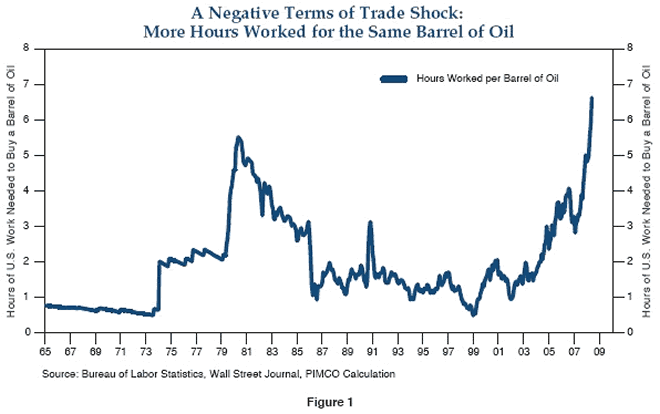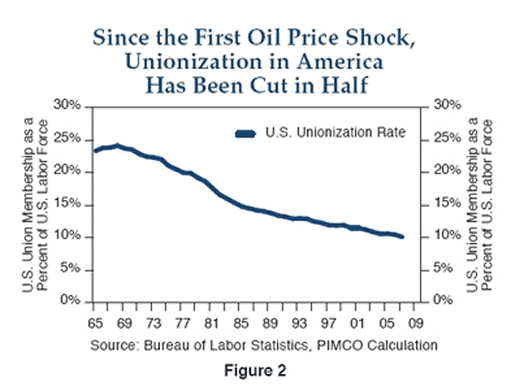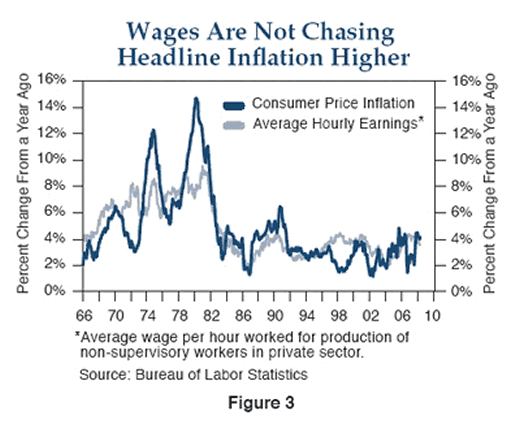Inflation and Negative Real Interest Rates are Necessary to Avoid Depression
Economics / Inflation Jun 24, 2008 - 05:51 AM GMTBy: John_Mauldin
 This week's Outside the Box will challenge a few of your base assumptions. Paul McCulley, the managing director at PIMCO, offers us a kind word for inflation and the reasons that the Fed will be on hold for a lot longer than the markets currently think. And part of that is to avoid a real recession or even a depression. Getting this debate right is important.
This week's Outside the Box will challenge a few of your base assumptions. Paul McCulley, the managing director at PIMCO, offers us a kind word for inflation and the reasons that the Fed will be on hold for a lot longer than the markets currently think. And part of that is to avoid a real recession or even a depression. Getting this debate right is important.
These are indeed interesting times we live in. I look forward to being with Paul at the end of July on our Maine fishing expedition, where he can defend his proposition to the group of economists and analysts gathered there. Have a great week.
John Mauldin, Editor
Outside the Box
A Kind Word for Inflation
by Paul McCulley
No, I have not lost my mind. I'm fully aware that inflation is not kind to bonds, so offering a kind word for inflation is de facto offering an unkind word about my own business. Investment managers don't tend to do that. But facts are facts. And the essential fact right now is that the American economy needs an inflation rate above the Fed's comfort zone. Needs, you ask?
Yes. Soaring commodity prices, particularly for petroleum and food, and especially in recent months, are an unambiguous negative real terms of trade shock to America. For those not familiar with the term, a nation's terms of trade is the ratio of what it must give up to get what it imports. The easiest way to understand the concept, at least for me, is to think of the number of hours of work necessary, at the average national hourly pay rate, to buy a barrel of oil – a real variable compared to another real variable. The chart below tells that simple story.

Misery Is as Misery Does
Americans are working more hours for the same barrel of oil. That is a negative real terms of trade shock. Put differently, we are less rich or more poor than we were before oil prices took off. There is no getting ‘round this. In turn, there is no escaping collateral adjustments of temporarily higher inflation and temporarily lower growth and employment. The question of the hour is how this pain should be apportioned. Last week, Fed Vice Chairman Don Kohn provided the right answer, presuming there is a right answer (my emphasis):
" ... an appropriate monetary policy following a jump in the price of oil will allow, on a temporary basis, both some increase in unemployment and some increase in price inflation. By pursuing actions that balance the deleterious effects of oil prices on both employment and inflation over the near term, policymakers are, in essence, attempting to find their preferred point on the activity/inflation variance-tradeoff curve introduced by John Taylor 30 years ago. Such policy actions promote the efficient adjustment of relative prices: Since real wages need to fall and both prices and wages adjust slowly, the efficient adjustment of relative prices will tend to include a bit of additional price inflation and a bit of additional unemployment for a time, leading to increases in real wages that are temporarily below the trend established by productivity gains. " 1
Mr. Kohn was preaching the raw, honest truth: a surge in oil prices raises the Misery Index, temporarily lifting both inflation and the unemployment rate. In turn, those outcomes beget lower real wages and, presumably, lower real profits, too. We are less rich or more poor – period. Thus, those who holler and scream at the Fed for letting the inflation genie out of the bottle need to calm down. A negative terms of trade shock is a real shock, so it must be translated into lower real wages and profits. That simple and that painful. Logically, it also must be translated for a time into lower, even negative, real short-term interest rates, the rate of return on money.
Spiral Risk?
But, you retort, if the Fed surrenders to negative real interest rates, it will set off an inflationary spiral, as second and third round effects on prices and wages take hold: capital and labor will extrapolate what should be viewed as a transitorily higher inflation into permanently higher inflation. In a world of perfectly indexed prices and wages, this could well be the case. The 1970s resembled such a world, and nasty oil price shocks that should have been one-off adjustments in the price level via temporarily higher inflation morphed into a price-wage-price inflationary spiral.
In monetary policy terminology, inflation expectations in the 1970s were not firmly anchored at the pre-oil price shock level. This is true, I think, but more elementally, the highly unionized, closed-economy structure of the American economy price and wage setting process was inherently geared to transforming a one-off inflationary shock into an enduring inflationary shock.

We no longer live in such a world. Most importantly, wage inflation is now only loosely connected to price inflation, in the wake of a more globally competitive, less unionized labor force. As Vice Chairman Kohn hinted, the combination of somewhat higher inflation and higher unemployment is a prescription for diminished pricing power by labor, leading to lower real wages (than would be dictated by labor's productivity growth). Thus, unlike the 1970s, there is little wage fuel to generate over-heating aggregate demand and, thus, a sustained price-wage-price inflationary spiral.
This is good news indeed. Fed officials would make this argument through the lens of well-anchored inflationary expectations, and I have no quarrel with that interpretation, though I think it is but a veil over a more global, more competitive, less oligopolistic price and wage setting structure in the United States. Indeed, I believe the more nasty is the negative terms of trade shock, the fatter is the fat tail of asset price deflation rather than the fat tail of accelerating goods and services inflation.
Avoiding a Modern Day Depression
Deflating asset prices in a highly levered economy are a much more nefarious outcome than temporary increases in inflation in goods and services. This is particularly the case from a starting point of low inflation in goods and services (excluding those involved in the negative terms of trade shock). How so? Simple: a negative terms of trade shock and asset price deflation are a prescription for not just a recession, but a nasty one. More to the point, from a starting point of low goods and services inflation, the Fed is never far from the zero lower limit on nominal short-term interest rates, commonly known as a liquidity trap.
Therefore, the more flexible are wages in the face of a negative terms of trade shock, particularly if it coincides with asset price deflation, the greater is the risk of policy makers losing control of the economy on the downside. In turn, this reality argues for the Fed to tolerate higher headline inflation in the wake of a negative terms of trade shock.
To be sure, the Fed must be aware of the dreaded second and third round effects, constantly checking to make sure that real wages and real profits are being eroded by the aberrantly high headline inflation. But, assuming the evidence supports that thesis, as the following graph displays, it would be an absolute folly for the Fed – or any central bank in similar circumstances – to hike interest rates in an attempt to make the negative terms of trade shock go away. By definition, it can't. And if it tries, it will create an even bigger mess. In this case, the motto of a central bank should be the same as that of a physician: first, do no harm.
I think the Fed thoroughly understands these exigencies in the wake of a negative terms of trade shock. It doesn't mean that the Fed won't or shouldn't rhetorically sound tough at times, in the name of preventing inflationary expectations from becoming unmoored. But the bottom line is that as long as there is a huge gulf between the negative terms of trade cup and the wage inflation lip, the Fed should talk about the cup and focus on the lip.

Bottom Line
Which means, my friends, that low, even negative real short-term interest rates are here to stay for a considerable period. Yes, I know that many believe that it is somehow sinful or immoral for the Fed to hold nominal short rates so low as to render the real return on cash to be negative. I don't buy this proposition. Why should it be that those who only have labor to offer to the market should not be made whole for a negative terms of trade shock, while those with cash should be made whole?
In the wake of a negative terms of trade shock, all factors of production should absorb a negative hit to their real returns. If indexing to headline inflation is inappropriate for labor wages and capital's profits, why should cash yields be indexed by the Fed?
And what if holders of cash don't like it? Then they can step out on the risk spectrum. After all, a basic of capitalism is no risk, no reward. And temporarily higher inflation in the wake of a negative terms of trade shock is an efficient lubricant for the economy to make the necessary real adjustments.
Paul McCulley
Managing Director
June 16, 2008
mcculley@pimco.com
1 http://www.federalreserve.gov /newsevents/speech/Kohn20080611 a.htm
Your betting the Fed will be on hold a long time analyst,
By John Mauldin
John Mauldin, Best-Selling author and recognized financial expert, is also editor of the free Thoughts From the Frontline that goes to over 1 million readers each week. For more information on John or his FREE weekly economic letter go to: http://www.frontlinethoughts.com/learnmore
To subscribe to John Mauldin's E-Letter please click here:http://www.frontlinethoughts.com/subscribe.asp
Copyright 2008 John Mauldin. All Rights Reserved
John Mauldin is president of Millennium Wave Advisors, LLC, a registered investment advisor. All material presented herein is believed to be reliable but we cannot attest to its accuracy. Investment recommendations may change and readers are urged to check with their investment counselors before making any investment decisions. Opinions expressed in these reports may change without prior notice. John Mauldin and/or the staff at Millennium Wave Advisors, LLC may or may not have investments in any funds cited above. Mauldin can be reached at 800-829-7273.
Disclaimer PAST RESULTS ARE NOT INDICATIVE OF FUTURE RESULTS. THERE IS RISK OF LOSS AS WELL AS THE OPPORTUNITY FOR GAIN WHEN INVESTING IN MANAGED FUNDS. WHEN CONSIDERING ALTERNATIVE INVESTMENTS, INCLUDING HEDGE FUNDS, YOU SHOULD CONSIDER VARIOUS RISKS INCLUDING THE FACT THAT SOME PRODUCTS: OFTEN ENGAGE IN LEVERAGING AND OTHER SPECULATIVE INVESTMENT PRACTICES THAT MAY INCREASE THE RISK OF INVESTMENT LOSS, CAN BE ILLIQUID, ARE NOT REQUIRED TO PROVIDE PERIODIC PRICING OR VALUATION INFORMATION TO INVESTORS, MAY INVOLVE COMPLEX TAX STRUCTURES AND DELAYS IN DISTRIBUTING IMPORTANT TAX INFORMATION, ARE NOT SUBJECT TO THE SAME REGULATORY REQUIREMENTS AS MUTUAL FUNDS, OFTEN CHARGE HIGH FEES, AND IN MANY CASES THE UNDERLYING INVESTMENTS ARE NOT TRANSPARENT AND ARE KNOWN ONLY TO THE INVESTMENT MANAGER.
John Mauldin Archive |
© 2005-2022 http://www.MarketOracle.co.uk - The Market Oracle is a FREE Daily Financial Markets Analysis & Forecasting online publication.



